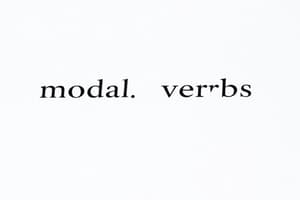Podcast
Questions and Answers
In what context is 'may' generally preferred over 'might' when discussing possibility?
In what context is 'may' generally preferred over 'might' when discussing possibility?
- Expressing unexpected events
- Academic or formal language to describe characteristics or behavior (correct)
- Asking for permission
- Informal conversations about future actions
It is appropriate to use 'may' in questions to inquire about the possibility of something happening.
It is appropriate to use 'may' in questions to inquire about the possibility of something happening.
False (B)
Provide an example of a modal verb used to ask for permission in a formal way as it is used with may:
Provide an example of a modal verb used to ask for permission in a formal way as it is used with may:
May I leave now? or May I help you?
To emphasize an unexpected event, one might use the phrase '_____ well'.
To emphasize an unexpected event, one might use the phrase '_____ well'.
Match the modal verb construction with its appropriate context:
Match the modal verb construction with its appropriate context:
Which sentence correctly uses 'might' to describe a typical past event?
Which sentence correctly uses 'might' to describe a typical past event?
In the pattern 'may/might not + bare infinitive...but...', the phrase following 'but' negates the initial limitation or weakness.
In the pattern 'may/might not + bare infinitive...but...', the phrase following 'but' negates the initial limitation or weakness.
Construct a sentence using 'may not + bare infinitive...but...' to express a compensatory characteristic.
Construct a sentence using 'may not + bare infinitive...but...' to express a compensatory characteristic.
To describe a possible ongoing activity in the present, use 'may/might + _____ + -ing'.
To describe a possible ongoing activity in the present, use 'may/might + _____ + -ing'.
Which of the following sentences uses 'may' or 'might' correctly to describe a possible past event?
Which of the following sentences uses 'may' or 'might' correctly to describe a possible past event?
The use of 'could' is not interchangeable with 'may' or 'might' when discussing possible past, present, or future events.
The use of 'could' is not interchangeable with 'may' or 'might' when discussing possible past, present, or future events.
Create a sentence using 'may/might have been + -ing' to describe a possible past activity over a period of time.
Create a sentence using 'may/might have been + -ing' to describe a possible past activity over a period of time.
When talking about a possible event in the past, we use 'may/might' + _____ + past participle.
When talking about a possible event in the past, we use 'may/might' + _____ + past participle.
Which sentence is grammatically incorrect?
Which sentence is grammatically incorrect?
According to correct grammar, this sentence is correct: 'I may have told you this before. I can't remember.'
According to correct grammar, this sentence is correct: 'I may have told you this before. I can't remember.'
Complete the sentence with the correct form of 'may' or 'might': 'It _____ well be the case that the evidence has been tampered with.'
Complete the sentence with the correct form of 'may' or 'might': 'It _____ well be the case that the evidence has been tampered with.'
If someone said 'I feel really sore after playing tennis', they _____ have a bath.
If someone said 'I feel really sore after playing tennis', they _____ have a bath.
Which of the following is correct?
Which of the following is correct?
The following construction is grammatically correct: She might has been trying to get a book off the top shelf when she fell.
The following construction is grammatically correct: She might has been trying to get a book off the top shelf when she fell.
What is the most appropriate modal verb to use: I _____ go to Majorca for our holiday this summer.
What is the most appropriate modal verb to use: I _____ go to Majorca for our holiday this summer.
The planet Venus _____ be seen clearly in the night sky this month.
The planet Venus _____ be seen clearly in the night sky this month.
Match the sentence completion:
Match the sentence completion:
Which of the answers would most suit the completion to this sentence: 'He may not be the best singer in the world, but...'?
Which of the answers would most suit the completion to this sentence: 'He may not be the best singer in the world, but...'?
The completed form of this sentence is correct: He may / might not work very quickly but at least he's very reliable..
The completed form of this sentence is correct: He may / might not work very quickly but at least he's very reliable..
The exercise gives the prompt 'but his opinions on music make you think'. What is the most appropriate modal verb to use in conjuction with 'He'?:
The exercise gives the prompt 'but his opinions on music make you think'. What is the most appropriate modal verb to use in conjuction with 'He'?:
Flashcards
May and Might
May and Might
Used for possibilities; more formal for characteristics, less formal for future plans.
May well / Might well
May well / Might well
Emphasizes that something is unexpected
Might + bare infinitive
Might + bare infinitive
Used to emphasize something that was typically the case in the past. It has a formal or literary tone
May/might not + but
May/might not + but
Signup and view all the flashcards
May/might + have/be + -ing
May/might + have/be + -ing
Signup and view all the flashcards
May / might have been + -ing
May / might have been + -ing
Signup and view all the flashcards
Might have enjoyed / Might enjoy
Might have enjoyed / Might enjoy
Signup and view all the flashcards
Might have tried / Might have been trying
Might have tried / Might have been trying
Signup and view all the flashcards
Might have come / Might be coming
Might have come / Might be coming
Signup and view all the flashcards
May be moving / May have moved
May be moving / May have moved
Signup and view all the flashcards
May have been improving / May have improved
May have been improving / May have improved
Signup and view all the flashcards
Might be imprisoned / May be imprisoned
Might be imprisoned / May be imprisoned
Signup and view all the flashcards
May have been exaggerating / May exaggerate
May have been exaggerating / May exaggerate
Signup and view all the flashcards
Might be punishing / Might be punished
Might be punishing / Might be punished
Signup and view all the flashcards
May have told / May tell
May have told / May tell
Signup and view all the flashcards
Study Notes
- May and might often have a similar meaning when talking about possibility.
- May is often preferred in academic or formal language to talk about characteristics or behavior.
- Might is often preferred in speech to talk about what we will possibly do in the future.
- May well (or might well) can emphasize that something is unexpected.
- May should not be used to ask questions about the possibility of something happening. Use could(n't) or the phrase "be likely" instead.
Using Might in Questions
- Might can be used in questions, but it is more formal.
- May can be used to ask for permission or offer help in a formal way.
Might + Bare Infinitive
- Might (not may) + bare infinitive can be used to talk about what was typically the case in the past, but this is a formal or literary usage.
- Could + bare infinitive can also be used to talk about past ability.
Compensating Characteristics
- Use "may / might not + bare infinitive ... but ..." or "may / might not have + past participle ... but ..." when a person or thing compensates for a limitation with another characteristic.
Talking About Possible Events
- Use "may / might (not 'can') + have + past participle" to talk about possible events in the past, present, and future.
- Use "may / might (not 'can') + be + -ing" to talk about possible events in the present and future.
- Could can be used in place of may or might in these sentences.
- Use "may / might have been + -ing" to talk about possible situations or activities that went on over a period of past time.
Exercises
- Exercise 17.1 requires completing sentences with "may" or "might," or an alternative if neither fits.
- Exercise 17.2 requires identifying the correct answer utilizing C & E.
- Exercise 17.3 requires one to complete the sentences in any appropriate way, with focus on D.
- Exercise 17.3 requires one to expand the notes to complete the sentences provided.
Studying That Suits You
Use AI to generate personalized quizzes and flashcards to suit your learning preferences.




